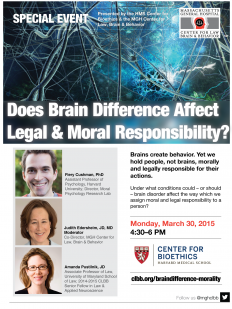By Sara Reardon | Nature | 25 February 2015
This article features Amanda Pustilnik, the 2014-2015 Senior Fellow in Law & Applied Neuroscience at CLBB and The Petrie-Flom Center for Health Law Policy, Biotechnology, and Bioethics at Harvard Law School. Pustilnik’s involvement in the CLBB Pain & Suffering Working Group and their recent Symposium is cited. Nature also published an editorial on pain imaging in the same issue.
Annie is lying down when she answers the phone; she is trying to recover from a rare trip out of the house. Moving around for an extended period leaves the 56-year-old exhausted and with excruciating pain shooting up her back to her shoulders. “It’s really awful,” she says. “You never get comfortable.”
In 2011, Annie, whose name has been changed at the request of her lawyer, slipped and fell on a wet floor in a restaurant, injuring her back and head. The pain has never eased, and forced her to leave her job in retail.
Annie sued the restaurant, which has denied liability, for several hundred thousand dollars to cover medical bills and lost income. To bolster her case that she is in pain and not just malingering, Annie’s lawyer suggested that she enlist the services of Millennium Magnetic Technologies (MMT), a Connecticut-based neuroimaging company that has a centre in Birmingham, Alabama, where Annie lives. MMT says that it can detect pain’s signature using functional magnetic resonance imaging (fMRI), which measures and maps blood flow in the brain as a proxy for neural activity. Continue reading »




